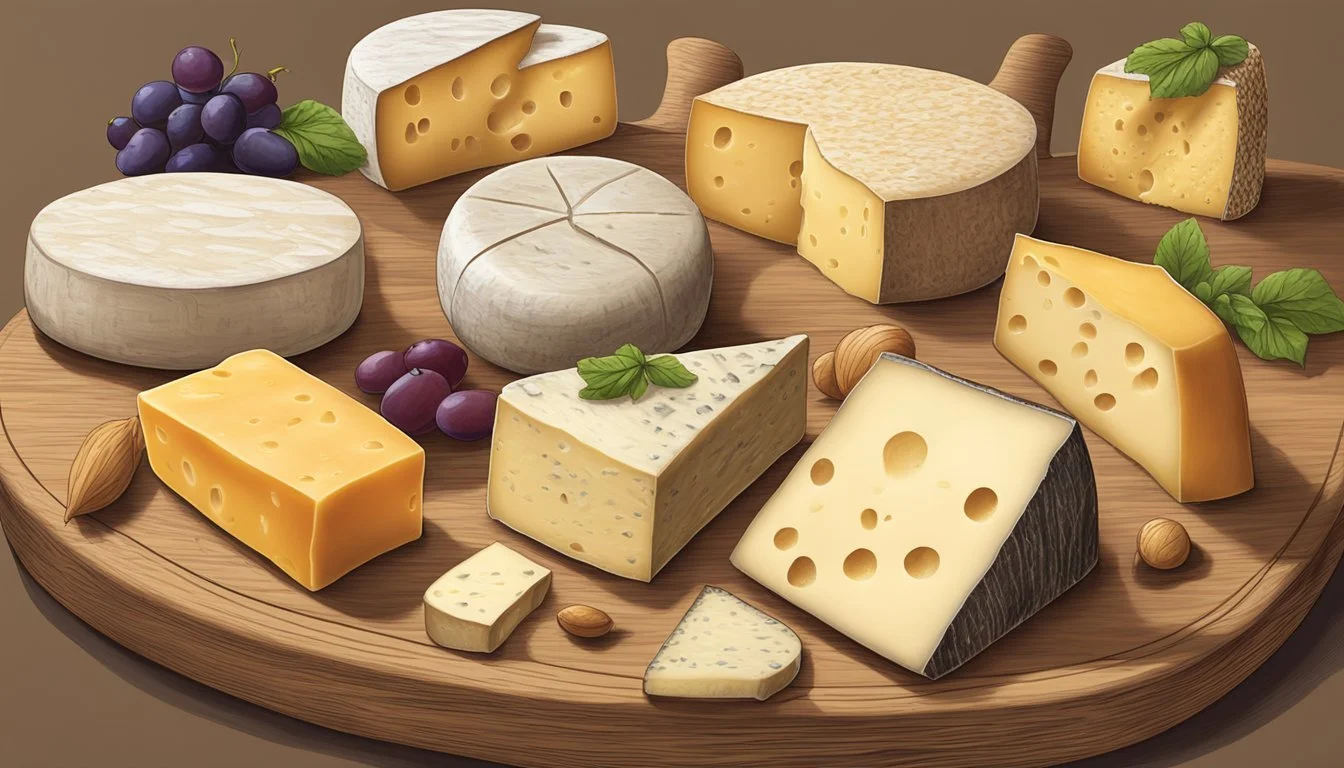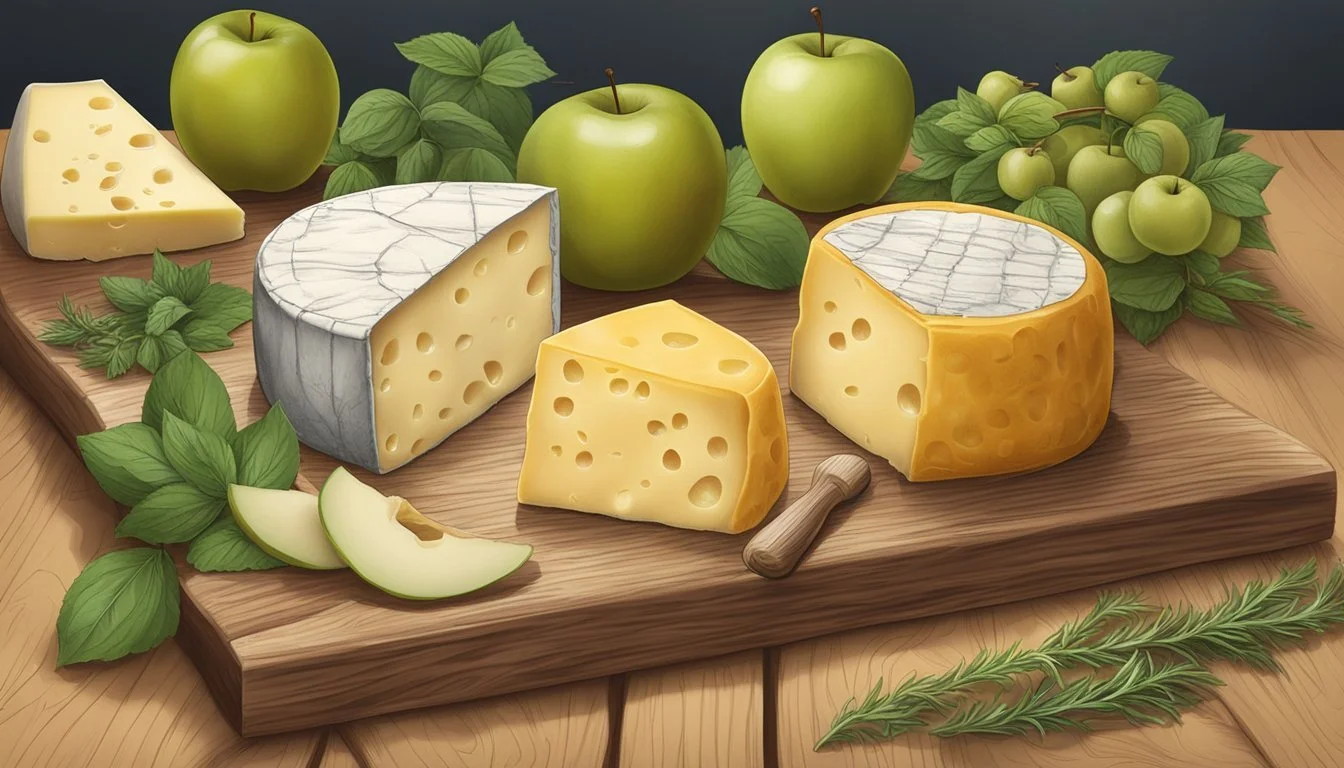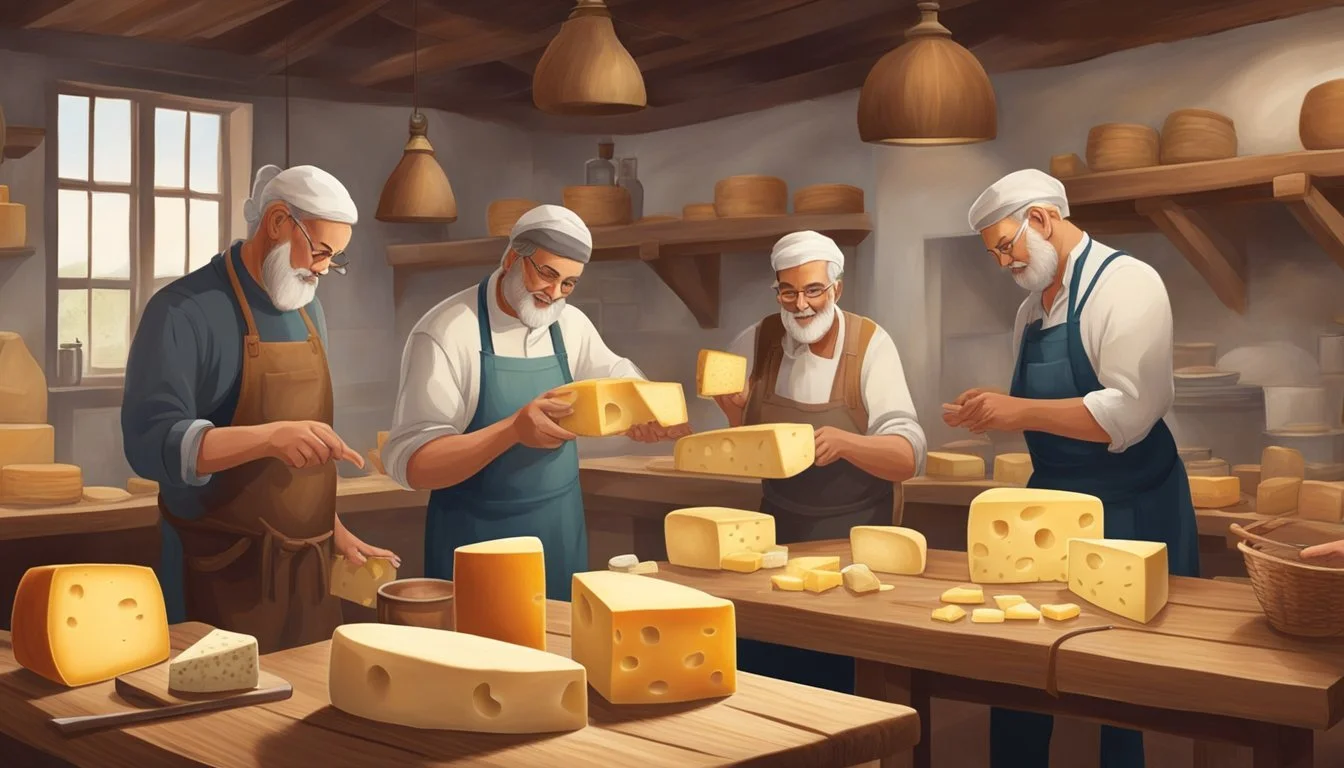Michigan Artisan Cheese
A Guide to the State's Finest Dairy Delights
Michigan stands as a notable region for cheese (how long does cheese last?) enthusiasts, where the craft of artisan cheese-making is both a tradition and a growing trend. With a diverse array of dairies and creameries sprinkled throughout the state, Michigan offers a variety of locally produced cheeses (What wine goes well with cheese?) that reflect the unique terroir of the area. From tangy hard cheeses to smooth and creamy soft varieties, the state's artisans utilize the rich, high-quality milk from local farms to create products that not only taste good but also tell a story of Michigan's agricultural heritage.
Among the acclaimed Michigan cheesemakers is the Leelanau Cheese Company, situated near Suttons Bay, which has earned recognition for their exceptional Leelanau Raclette and Leelanau Reserve. Equally impressive, Saltless Sea Creamery focuses on Mediterranean-inspired cheeses crafted with care in Traverse City, emphasizing the importance of locality and seasonal variation in their selection. Furthermore, small-batch producers like Boss Mouse Cheese in Kingsley and Charlevoix Cheese Co. reinforce the artisanal approach, prioritizing handcrafted methods and a close connection to the source of their ingredients, the well-tended local Holstein cattle.
History and Tradition of Michigan Artisan Cheese
Michigan's rich heritage in artisan cheesemaking reflects a commitment to tradition and provides a sense of joy throughout every season.
Evolution of Cheese Making in Michigan
The craft of artisan cheese in Michigan has seen significant growth, with roots stretching back to the state's agricultural beginnings. Initially, cheese making followed traditional methods with a limited number of varieties. By the late 20th century, only a handful of artisan cheesemakers were present in the state. However, as interest in farmstead and artisanal products gained traction, Michigan experienced a renaissance in cheese production.
By 2012, the growth was evident, with 826 artisan cheesemakers counted across the United States, many of whom are based in Michigan and contribute to the state's diverse and rich cheese offerings. Michiganders embrace the art of cheese making with a robust enthusiasm that carries through to the present day, ensuring that traditional techniques are not just preserved but celebrated.
Influence of Immigrant Traditions
Michigan's artisan cheese narrative is deeply intertwined with the influence of immigrant traditions. Many Michigan cheesemakers boast a legacy of European cheesemaking practices that have been passed down and adapted over generations. This is exemplified in the Swiss-influenced cheese-making approach at Leelanau Cheese, where founders John and Anne Hoyt have translated their experiences from the Swiss Alps to their Michigan-based operations.
These European influences are integral to the unique flavors and styles found in Michigan artisan cheeses today. From the nationally recognized raclette to an assortment of goat cheeses, there's a palpable joy in the way old-world methods merge with Michigan's local terroir, resulting in seasonally inspired, flavorful cheeses that reflect both the history and the innovation within the state's borders.
Types of Artisan Cheese in Michigan
Michigan's artisan cheesemakers are renowned for their diverse and skillfully crafted cheeses, ranging from traditional varieties to unique local specialties that reflect the state's dairy heritage and innovation in cheese-making.
Raclette and Its Origins
Leelanau Cheese Company in Suttons Bay, MI, has garnered recognition with their award-winning, cave-aged Leelanau Raclette. This semi-firm cheese, with a notably creamy texture and nutty flavor, has its origins in Switzerland but has been masterfully adapted to the terroir of Northern Michigan. The company's European-style cheese also includes a Leelanau Reserve, both of which can be attributed to their deep flavor profiles and traditional aging techniques.
Cheddar and Small-Batch Varieties
Boss Mouse Cheese, started by Sue Kurta, focuses on small-batch, handcrafted cheeses. Among their products, cheddar—a cheese that finds its origins in England—stands out as Kurta's favorite. They produce this staple in aged and pasteurized forms, highlighting the depth of flavor that can be achieved through artisanal practices.
Cheddar Varieties:
Aged
Pasteurized
Additionally, Michigan features fromage blanc, a versatile and soft cheese, lending itself well to both savory and sweet applications, further evidencing the diversity within Michigan’s small-batch cheese varieties.
Unique Local Flavors
Saltless Sea Creamery presents Michigan’s version of Italian Caciocavallo with a cheese that is aged for 60 to 120 days, offering a savory profile reminiscing of aged provolone. Another local specialty is the Parmichigano, which pays homage to Parmigiano Reggiano and is tailored to the local palate and region's conditions.
Michigan is also the birthplace of the traditional Pinconning cheese, a semi-hard, American Colby-style cheese named after its town of origin and noted for its special savory flavor that develops with aging, often extending up to 120 months.
Artisan Varieties Inspired by Italian Classics:
Caciocavallo
Parmichigano
These cheeses just scratch the surface of the state's rich culture of cheese-making, with each cheese telling a story of Michigan's dairying tradition and artisanal craftsmanship.
The Cheese Making Process
Crafting artisan cheese in Michigan involves a meticulous process, where creameries carefully control every aspect from the type of milk to the aging environment. This section will explore the intricacies of using pasteurized versus raw milk, the traditional cave-age techniques for maturing cheese, and the steps in turning curd into distinctive cheese forms.
Pasteurized vs. Raw Milk Choices
Artisan cheesemakers in Michigan must decide whether to use pasteurized or raw milk in their cheese production. Pasteurization is the process of heating milk to eliminate pathogens, ensuring safety and extending shelf life. In contrast, raw milk cheeses retain more natural flavors but require strict adherence to safety protocols to minimize health risks. The choice affects the cheese’s ultimate flavor profile and texture, as well as its compliance with regulations supervised by the Michigan Department of Agriculture and Rural Development (MDARD).
The Art of Aging: Cave-Age Techniques
The aging process, particularly cave-age techniques, is essential to developing the flavors and textures of artisanal cheese. Michigan creameries often employ cave-age methods, where cheese is matured in temperature and humidity-controlled environments resembling traditional caves. This controlled aging is key to cultivating the unique character of the cheese, allowing for the development of a complex flavor profile and, for certain varieties, the formation of a natural rind.
Curd Processing and Cheese Formation
The transformation of milk into cheese is a fascinating journey, starting with the coagulation of milk to form curds. This process involves the careful addition of enzymes like rennet and the manipulation of temperature and acidity. Artisan cheesemakers in Michigan meticulously cut, stir, and heat the curds to achieve the desired consistency. The curds are then pressed into molds, forming the basis of the final cheese product. Each step in curd processing is crucial in defining the texture, moisture content, and structural integrity of the artisanal cheese.
Michigan's Top Artisanal Cheese Producers
Michigan's artisanal cheese scene celebrates a rich tradition and diversity of cheeses crafted by skilled cheesemakers. The region boasts producers who have gained recognition for their European-style creations as well as innovative American originals.
Leelanau Cheese Company
Leelanau Cheese Company, operated by Joshua Hall and Gary Smith, is renowned for its European influenced cheeses, including its award-winning raclette. This Suttons Bay-based cheesemaker has a knack for producing cave-aged European style cheese, and its Leelanau Raclette has earned top honors in global cheese competitions.
Charlevoix Cheese Company
While not detailed in the search results, Charlevoix Cheese Company would be a fictional addition to Michigan's rich tapestry of artisanal cheesemakers. They would likely focus on producing high-quality cheeses with a local twist, incorporating the flavors and traditions of the Charlevoix, Michigan area.
Saltless Sea Creamery and Other Notables
Saltless Sea Creamery, located near Traverse City, Michigan, pays homage to classic cheese types while infusing local terroir. Their take on Italian Caciocavallo, matured for 60-120 days, echoes aged provolone with a distinct Northern Michigan character.
Boss Mouse Cheese, another reputable artisan cheesemaker, is also part of this vibrant community, creating small-batch cheeses with a personal touch.
Each of these producers contributes to Michigan's reputation as a haven for artisan cheesemaking, showcasing the state's capability to produce cheeses that stand proudly on the international stage.
The Role of Local Ingredients
The distinct quality and character of Michigan's artisan cheese stem from the use of local ingredients, highlighting the state's rich dairy heritage.
Utilization of Michigan Dairy
Michigan's dairy farms are integral to the production of artisan cheese, providing a consistent supply of fresh, high-quality milk. The state's artisan cheesemakers depend on this resource to craft their products. These dairy farms often grow their own feed—such as corn and hay—ensuring that the milk produced by their herds is of the highest caliber. The intimate connection between the farms and the cheesemakers allows for a fresher product and a more sustainable approach to cheesemaking.
Boss Dairy Farms in Charlevoix is an example of a dairy farm that uses milk from its 230 Holstein cattle for cheesemaking under the Charlevoix Cheese Company brand.
Incorporating Local Flavors and Ingredients
Michigan cheesemakers not only rely on their dairy farms but also incorporate a variety of local flavors and ingredients that reflect the state's agricultural bounty. Ingredients like homemade preserves or vegetables from local gardens find their way into specialty cheeses, infusing them with unique Michigan tastes.
Artisan cheeses may feature herbs and fruits that are grown in the region, lending each cheese a distinct flavor that can't be duplicated elsewhere.
Incorporating local ingredients supports Michigan agriculture and adds an element of local pride to each wheel of cheese.
Seasonal Variations and Cheese
The character of Michigan's artisan cheeses is deeply influenced by the seasons, imparting distinct flavors and offering varied cheese products throughout the year.
Seasonal Milking and Its Impact on Flavor
Dairy cows' milk production cycles align with the seasons, affecting the taste and texture of the cheese. In spring and summer, cows graze on the lush pastures, leading to milk that is rich in beta-carotene and producing cheeses with brighter flavors and softer textures. Conversely, winter milk is often higher in fat, contributing to a more buttery and rich cheese. These subtle nuances accentuate the seasonal charm of local cheeses.
Spring/Summer: Milk contains more beta-carotene, resulting in vibrant flavors.
Winter: Higher fat content yields richer, more buttery cheeses.
Seasonal Cheese Offerings
Michigan cheesemakers tailor their offerings to take advantage of the seasonal milk quality. Fresh, mild cheeses like mozzarella are popular in the warmer months, perfectly complementing the season's produce. During cooler seasons, aged cheeses such as cheddar, which develop complex flavors over time, are prominent. The seasonal cycle thus not only dictates the cheese-making process but also the variety of cheeses available throughout the year.
Warm Months: Focus on fresh, mild cheeses like mozzarella.
Cooler Months: Emphasis on aged cheeses with developed flavors.
Cheese in Michigan's Culinary Scene
Michigan’s culinary scene takes great pride in its local artisan cheeses, which encompass a variety of unique flavors and styles, integral to regional parings and featured prominently in restaurants and eateries.
Pairings and Recipes
Artisan cheese from Michigan pairs delightfully with local offerings. For instance, the semi-firm cheese reminiscent of aged provolone is ideal with crusty bread, enhancing its savoriness. Other cheeses, such as those infused with garlic, provide a robust flavor profile that enhances the overall tasting experience. Chefs across Michigan incorporate these cheeses into recipes that pay homage to the region, often applying them in innovative ways to salads, pastas, and artisan sandwiches.
Michigan Cheese in Restaurants and Eateries
In restaurants across the state, Michigan's cheeses are a cornerstone of the menu. Eateries emphasize the distinct rich flavors of local cheese, such as the exquisite raclette at Leelanau Cheese, which chefs skillfully melt over dishes creating a display of culinary craftsmanship. Michigan restaurant goers savor the cheeses in their natural form or as part of complex dishes, relishing the freshness and regional taste that craft cheeses add to the meal.
Cultural and Social Aspects of Cheese Making
Artisanal cheese making in Michigan is not only a craft but also a social activity that binds communities and offers educational experiences.
Community Engagement and Local Celebrations
Community plays a pivotal role in the cheese-making culture of Michigan. Artisan cheesemakers, like John and Anne Hoyt of Leelanau Cheese, not only contribute to the local food scene but also embrace community engagement. They often participate in local celebrations, which fosters a sense of pride and heritage. Dave Omar, another key figure in the artisan cheese community, engages with the public through his shop. This involvement strengthens the bond between producers and consumers and elevates the appreciation for locally made cheeses.
Local Celebrations:
Cheese festivals
Farmers markets
Tasting events
Educational Opportunities and Visitor Experiences
Michigan's artisan cheesemakers provide educational opportunities and visitor experiences that are both informative and immersive. Workshops and cheese-making classes allow visitors to gain first-hand knowledge of the craft. Cheese shops also play a crucial role in educating the public. By hosting visitors, they offer insights into the art and science of cheese making. Instagram and social media serve as platforms where cheesemakers like Dave Omar share their knowledge and interact with a wider audience. Such experiences help demystify the process and enhance the social fabric around the tradition of cheese making.
Educational Initiatives:
Cheese-making workshops
Tours of creameries and dairies
Social media engagement for wide outreach
Acquiring Michigan Artisan Cheese
Michigan's artisan cheeses, often crafted with European techniques, are a true gourmet delight. They are available through various retail channels and can be enjoyed by enthusiasts far beyond the state's borders.
Retail Shops and Farmers’ Markets
In Northern Michigan, towns such as Suttons Bay and Northport boast specialty shops where one can find locally-made cheeses. Artisan cheesemakers leverage traditional methods to produce cheeses with unique flavors that are often sold directly to consumers through these retail outlets. Farmer’s markets across Michigan also serve as a hub for acquiring artisan cheese, providing customers with the chance to buy freshly-made products and interact directly with the cheesemakers.
Retail Locations:
Suttons Bay Cheesemakers Shop
Northport Cheese & Wine
Kingsley Artisan Market
Farmers’ Markets:
Northern Michigan Farmers’ Market (Seasonal availability)
Lansing Local Produce Fair
Online Purchases and Social Presence
Those unable to visit Michigan in person can still experience its artisan cheese offerings. Most cheesemakers have embraced online sales, enabling customers to purchase their products from anywhere. By visiting the official websites of these artisan cheesemakers, consumers can place orders and have Michigan’s finest cheeses delivered right to their doorstep. Additionally, social media platforms, particularly Instagram, are used by these artisans to showcase their products, share behind-the-scenes content, and connect with cheese lovers globally.
Online Outlets:
Leelanau Cheese’s Online Store
Idyll Farms’ Cheese Shop
Social Media Channels:
Instagram: @LeelanauCheese
Instagram: @IdyllFarms
By utilizing these platforms, the artisan cheesemakers of Michigan not only expand their reach but also establish a closer relationship with their customer base through regular engagement and updates about new offerings or events.
Sustainable Practices in Cheese Production
Michigan's artisan cheese producers are increasingly adopting sustainable practices that contribute to high-quality output while paying close attention to environmental stewardship and animal welfare.
Small-Scale Farms and Environmental Focus
Michigan's artisan cheese makers often operate on small-scale farms, enabling a heightened level of environmental focus. This approach typically allows for better control over farming practices, ensuring minimal impact on ecosystems. For instance, Suttons Bay cheese artisans are known to carefully manage their land to maintain natural biodiversity and soil health. Additionally, with small herds of Holstein cattle and other milking cows, the artisan cheese producers can effectively monitor and maintain a balance within their local environments, integrating sustainability into their cheese production processes.
Animal Welfare and Pasture Management
For artisan cheese producers, the welfare of their milking cows is paramount, as it directly influences the quality of the cheese. These producers provide their Holstein cattle and other dairy breeds with extensive pastureland, practicing ethical pasture management to ensure the animals maintain a high quality of life. Regular rotations and a diet of grass-fed pastures contribute to the well-being of the animals, which in turn produces superior milk for cheese making. Producers' commitment to animal welfare is not just a point of ethics but a cornerstone of their craft, tying directly back to the artisanal quality and uniqueness of their products.











